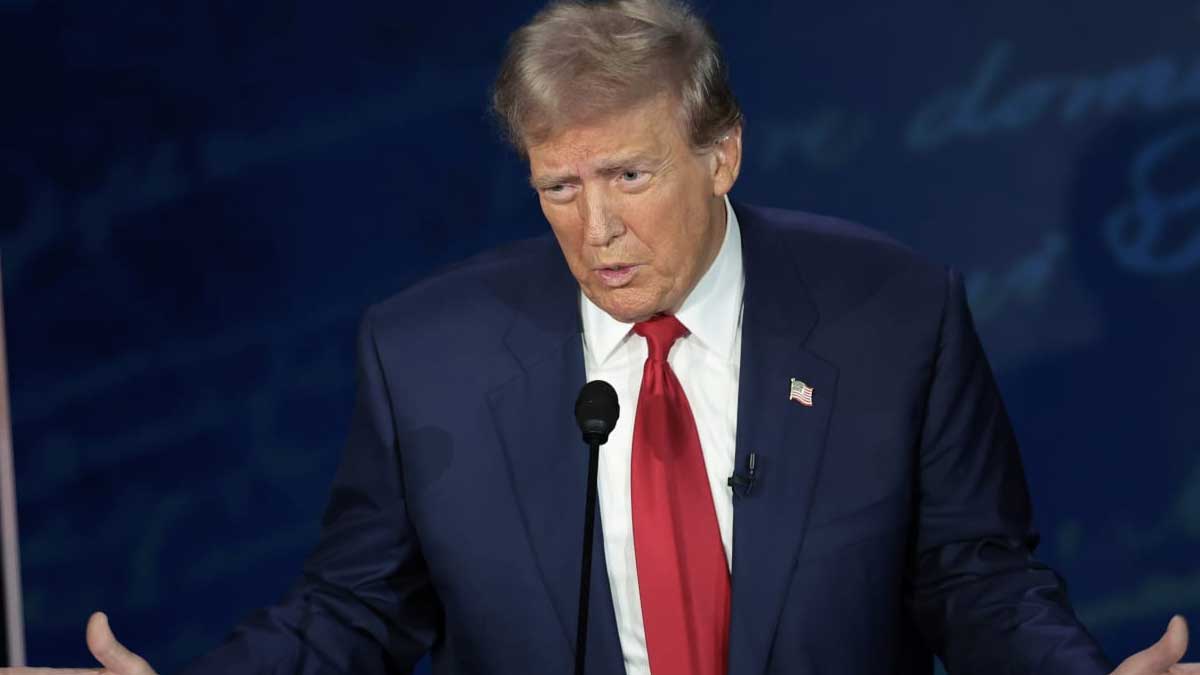- Home
- Billionaires
- Investing Newsletters
- 193CC 1000
- Article Layout 2
- Article Layout 3
- Article Layout 4
- Article Layout 5
- Article Layout 6
- Article Layout 7
- Article Layout 8
- Article Layout 9
- Article Layout 10
- Article Layout 11
- Article Layout 12
- Article Layout 13
- Article Layout 14
- Article Sidebar
- Post Format
- pages
- Archive Layouts
- Post Gallery
- Post Video Background
- Post Review
- Sponsored Post
- Leadership
- Business
- Money
- Small Business
- Innovation
- Shop
Recent Posts
Trump’s Debate Mistake: Misidentifying Taliban Leader

During a recent debate, former President Donald Trump made a notable error that has sparked significant discussion. While discussing his involvement in the negotiation of the U.S. withdrawal from Afghanistan, Trump inaccurately claimed that someone named “Abdul” was the leader of the Taliban. This misstatement occurred as he recounted a story from his presidency, during which he purportedly instructed “Abdul” to halt attacks on U.S. troops. Trump detailed sending this individual a photograph of his house, implying it was a threat. However, this narrative is riddled with inaccuracies. The actual leader of the Taliban since 2016 is Hibatullah Akhundzada, not “Abdul.” The name Trump likely intended to reference is Abdul Ghani Baradar, a key Taliban negotiator who played a crucial role in the peace talks with the U.S. during the Trump administration. Despite Baradar’s significant role in the negotiations, he has never held the position of Taliban leader. This confusion highlights a broader issue of accuracy and understanding in Trump’s recounting of his administration’s actions and relationships.
Trump’s debate remarks were made in the context of his criticism of President Joe Biden’s handling of the U.S. exit from Afghanistan, a withdrawal that ended in chaos and tragedy. In August 2021, the U.S. withdrawal culminated in a suicide bombing at Kabul’s Abbey Gate, which resulted in the deaths of 13 U.S. service members. This event has been widely criticized as a failure of the Biden administration’s execution of the withdrawal plan. The chaotic scenes and tragic loss of life have been used by Trump to attack Biden and Vice President Kamala Harris. However, Trump’s own role in setting the stage for this withdrawal is also under scrutiny. His administration’s agreement with the Taliban, known as the Doha Agreement, was intended to facilitate the U.S. exit but is now criticized for its shortcomings and the consequences that followed.
Vice President Kamala Harris used the debate to defend Biden’s decision to withdraw from Afghanistan. She challenged Trump’s criticisms by accusing him of negotiating a deal that was fundamentally flawed. Harris pointed out that Trump’s agreement included provisions for the release of 5,000 Taliban prisoners, a move she and others argue significantly weakened the U.S. negotiating position and contributed to the instability that followed the withdrawal. This critique reflects ongoing debates about the responsibility for the fallout from the withdrawal, with both Trump and Biden administrations facing blame for different aspects of the situation.
In addition to the debate controversy, Trump’s recent visit to Arlington National Cemetery added to his political challenges. Trump visited the cemetery to mark the third anniversary of the Abbey Gate bombing, but his visit was marred by allegations of misconduct. Reports emerged that Trump’s team filmed and photographed in Section 60, a restricted area of the cemetery designated for recent war casualties. Federal regulations prohibit such activities for political purposes. The Army accused a Trump aide of physically confronting a staff member who was attempting to prevent the filming. Trump’s campaign has disputed these claims, suggesting that the staff member had a mental breakdown and promising to release footage of the incident, although this footage has not yet been made public. The controversy led to criticism from Harris and other veterans, who accused Trump of disrespecting the gravesites. Conversely, some Gold Star families, including those affected by the Abbey Gate tragedy, defended Trump and criticized the Biden-Harris administration in response to the controversy.
The debate between Trump and Harris, hosted by ABC News, was their first direct encounter in a 90-minute session. Harris received praise for her performance, which included pointed criticisms of Trump’s handling of various issues. Her debate strategy effectively put Trump on the defensive, addressing topics such as abortion, his relations with dictators, and his legal troubles. The debate also covered significant issues like the Russia-Ukraine conflict, the Israel-Hamas situation, and economic policies, with Trump advocating for tariffs and Harris presenting her plans to support the middle class.
Following the debate, Harris’s campaign swiftly challenged Trump to a second debate. However, Trump has expressed uncertainty about participating in future debates, leaving the potential for further direct encounters between the two candidates up in the air. This debate underscores the ongoing tensions and controversies surrounding Trump’s presidency and his role in significant international and domestic issues. The inaccuracies regarding the Taliban’s leadership and the broader issues related to the U.S. withdrawal from Afghanistan continue to be contentious and heavily debated topics in American politics.
Recent Posts
Categories
- 193 Countries Consortium Partner1
- 193cc Digital Assets2
- 5G1
- Aerospace & Defense48
- AI37
- Arts3
- Banking & Insurance11
- Big Data3
- Billionaires1,467
- Boats & Planes1
- Business332
- Careers13
- Cars & Bikes79
- CEO Network1
- CFO Network17
- CHRO Network1
- CIO Network1
- Cloud10
- CMO Network18
- Commercial Real Estate7
- Consultant1
- Consumer Tech194
- CxO1
- Cybersecurity73
- Dining1
- Diversity, Equity & Inclusion4
- Education7
- Energy8
- Enterprise Tech29
- Events11
- Fintech1
- Food & Drink2
- Franchises1
- Freelance1
- Future Of Work2
- Games149
- GIG1
- Healthcare79
- Hollywood & Entertainment203
- Houses1
- India’s 1000 Richest1
- Innovation46
- Investing2
- Investing Newsletters4
- Leadership65
- Lifestyle11
- Manufacturing1
- Markets20
- Media327
- Mobile phone1
- Money13
- Personal Finance2
- Policy569
- Real Estate1
- Research6
- Retail1
- Retirement1
- Small Business1
- SportsMoney42
- Style & Beauty1
- Success Income1
- Taxes2
- Travel10
- Uncategorized14
- Vices1
- Watches & Jewelry2
- world's billionaires1,436
- Worlds Richest Self-Made Women2
Related Articles
South Korea Plane Crash: A Tragic Loss and Global Mourning
The tragic plane crash at South Korea’s Muan International Airport on Sunday...
By 193cc Agency CouncilDecember 30, 2024H-1B Visa Debate Splits Trump Allies and Silicon Valley
The debate over H-1B visas has once again become a contentious issue,...
By 193cc Agency CouncilDecember 28, 2024Trump Moves $4B Stake in Truth Social Parent, Stock Drops 6%
Donald Trump recently transferred his 57% stake in Trump Media & Technology...
By 193cc Agency CouncilDecember 20, 2024House Rejects Trump-Backed Funding Bill, Shutdown Looms
The U.S. House of Representatives rejected a new government funding bill on...
By 193cc Agency CouncilDecember 20, 2024















Leave a comment